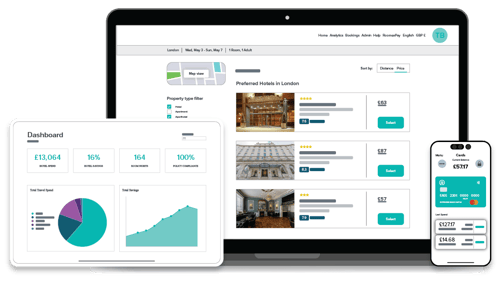The workforce is the single most important asset any business has – and of course, it’s often the most expensive, but that shouldn’t mean eating unnecessary costs especially when it comes to business travel.
CFOs shouldn’t take overspend or a lack of productivity for your travelling workforce as a given as there are many ways to influence productivity while still keeping costs low – here are nine of them!
1. Lean on KPIs to stay productive
Key Performance Indicators (KPIs) can be a powerful tool when managing a mobile workforce, especially with HVAC specialists or account managers sprawled across the country.
Set KPIs that track travel (cost for accommodation and daily expenses) as well as productivity (service calls made and leads converted into sales, for example) to make sure that everyone is on the same page as to what’s expected. It’ll keep your workforce on their toes while keeping costs down – win-win.
2. Communicate clearly and frequently
While they’re out of sight and sometimes out of mind, the mobile workforce can’t be forgotten. Whether they’re on extended business travel or on client sites conducting their regular maintenance routine, be sure to have clear guidelines as to how often they should be reporting in.
This rule goes both ways: remote employees want just as much feedback as those who work in-house. Schedule quarterly or bi-annual check-ins that give team members the face-to-face time they might not often get.
3. Get the whole team organized
If there isn’t any structure in place, companies can struggle with everything from business travel management to simple reporting techniques.
Develop a system to allow service and sales representatives to report and stay organised, no matter where they’re located. This should align with internal guidelines and could even move to a digital-only format for the sake of efficiency.
4. Make duty of care a focal point
Larger companies may have tens or hundreds of employees on the road at any given point. Keeping them safe should be the ultimate goal of travel bookers.
Ensure that there’s an established protocol in place for consistently evaluating the health and safety of team members, as well as any corresponding insurance needs. Regularly scheduled health and safety training is certainly an option, though it should be available in a digital format for those who aren’t onsite.
5. Clean up business travel arrangements
Managing the schedules of even a couple of individuals is difficult. It’s an entire job in itself for travel bookers who have an entire mobile workforce to look after.
Make their jobs easier by investing in a platform that can provide a bird’s eye view on the agendas of everyone in the company. Digitising the mobile workforce management process can benefit everyone involved.
6. Automate whenever possible
The saying goes, “If it isn’t broken then don’t fix it.” That doesn’t mean you can’t tweak things to be better, though.
Automation has been a boon for businesses that have a high volume of mobile workers and should be introduced wherever possible. The tools allow service repair technicians to seamlessly file reports on the go, or sales representatives to access and update the customer relationship management database at the touch of a button.
7. Build bridges between remote and on-site staff
Thriving company cultures are famous for their sense of community, but that’s nearly non-existent for those who are on the road every day for their job – which is a challenge for companies who want all their staff to feel involved, regardless of where they’re located.
After-work events are great bonding opportunities if they’re available to the majority of remote employees. Furthermore, introduce new chat applications as a standard across the business and gather staff feedback once a year to see what the company could do to create a better sense of community.
8. Meet unique needs with specialised platforms
When you live life on the road, accommodation means more to you than the average person. The mobile workforce is always on the go and their hotel can begin to feel like a second home, especially on long periods of project work.
Companies can make sure they’re getting the best location with the most affordable price possible by by using using a business hotel booking platform. The platforms use negotiated rates and dynamic pricing to find the best option, without compromising on quality.
9. Focus on happiness rates and retention will follow
Remote employees give a lot of their free time to the company. When the feeling of mutual investment isn’t reciprocated, businesses can see lower retention rates.
Businesses should proactively evaluate their ability to keep employees happy and make improvements where necessary.
Don’t forget that staff evaluations play an important role and can have an immediate impact on happiness if adjustments are made.
Ultimately, happy staff make better workers no matter where they are in the world – so keep that in mind!

February 18, 2019

